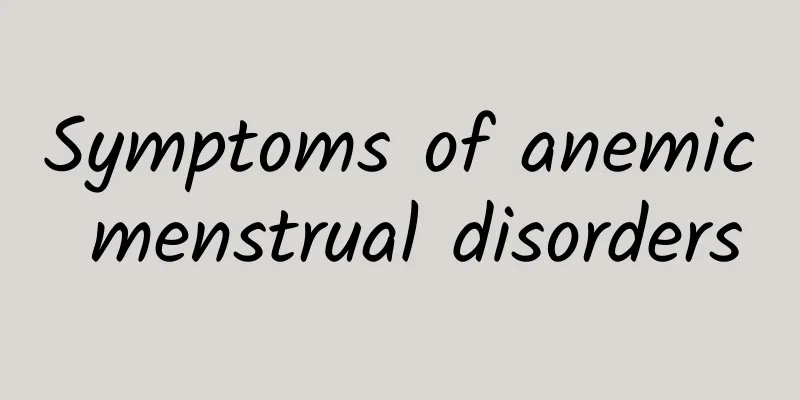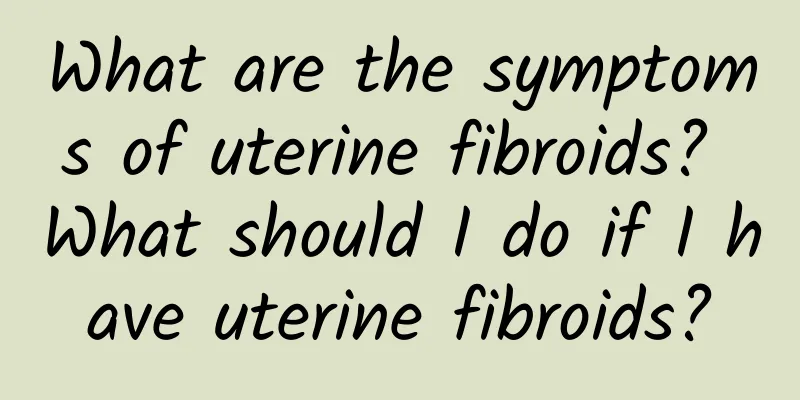Symptoms of anemic menstrual disorders

|
Symptoms of anemic menstrual disorders: Symptoms of irregular menstruation include premature menstruation, menstrual cramps, irregular menstruation, prolonged menstruation, uterine dysfunction, amenorrhea, dysmenorrhea, early menstrual tension syndrome, etc. Symptoms of irregular menstruation: 1. Early menstruation, menstrual period refers to the shortening of the menstrual cycle. This is a typical symptom of irregular menstruation, less than 21 days, more than 2 consecutive months, it is a biphasic basic body temperature ovulation dysfunction, the follicular phase is short, only 7-8 days, or the luteal phase is shorter than 10 days, or the body temperature rises less than 0.5°C. 2. After the menstruation is delayed for more than 7 days, including 40 to 50 days, and two consecutive menstrual cycles. During the ovulation period, the basic body temperature is biphasic, but the follicular phase is long, the high temperature phase is low, there is no ovulation, and the body temperature is in the basic phase. 3. Prolonged menstruation Normal menstrual cycle, prolonged menstruation, menstrual cycle more than 7 days, even 2 weeks before the end. Patients with inflammation usually have abdominal pain, aggravated menstruation, usually more leucorrhea, yellow or yellow-white, thick texture, delicious taste. Incomplete corpus luteum atrophy accompanied by menstrual volume; after normal menstruation, the endometrial repair is prolonged and there is still a small amount of persistent vaginal bleeding. 4. Irregular menstruation has been postponed or delayed, with a cycle of less than 21 or 35 days. Iron supplementation is the most basic method for treating iron deficiency anemia. Oral iron has obvious symptoms. It is best to treat it through diet. Animals rich in iron include liver and kidney, followed by lean meat, egg yolk, chicken, fish, shrimp and beans. Iron is found in green leafy vegetables, spinach, celery, rapeseed, lily and tomato. Fruits contain more apricots, peaches, plums, raisins, red dates, cherries, etc. |
<<: Is there menopause in your 30s?
>>: What tests are needed for endometriosis?
Recommend
Soy milk not only protects the cardiovascular system! There are 4 major benefits of drinking soy milk! Nutritionist Gao Minmin: 6 recipes for drinking soy milk in various ways
Waking up in the morning and drinking a cup of fr...
What are the obvious symptoms of uterine fibroids?
Do you know about uterine fibroids? What symptoms...
Is Bulletproof Coffee a Magic Tool for Weight Loss? Nutritionist: If you want to lose weight quickly with a ketogenic diet, be careful of these hidden landmines
The "Bulletproof Coffee" craze, which i...
What can I eat to relieve dysmenorrhea?
Menstrual cramps can be relieved by diet, includi...
What is pelvic effusion? Is it serious?
Whether the pelvic effusion is serious or not dep...
Diet therapy can help you solve the pain of dysmenorrhea
"Abdominal pain during menstruation" is...
Introduction: Two common symptoms of vulvar leukoplakia
With the improvement of women's social status...
What are the signs of miscarriage?
Pregnancy often makes many expectant mothers exci...
Beware of pelvic inflammatory disease if you have back pain during menstruation
Pelvic inflammatory disease is quite common in da...
Dizziness and stiff neck during menopause? Doing the "Giant Slalom Exercise" can improve blood circulation
For menopausal women, not only are they prone to ...
Eat less and exercise more but still gain weight and feel more tired? This turned out to be the culprit...
Why do you still get fat even if you eat less and...
Precautions before ectopic pregnancy surgery
What are the precautions before ectopic pregnancy...
Avoid losing weight a week before menstruation? Doctor Zhu Yuying: Grasp the three golden opportunities to help burn fat
Have you tried various weight loss methods but st...
How to relieve dysmenorrhea quickly
Dysmenorrhea can generally be treated by hot comp...
What should women do if they have cervicitis?
Cervicitis is a common disease in women's liv...









